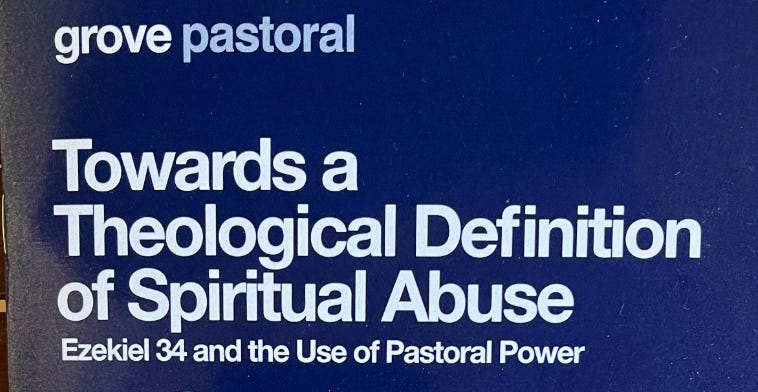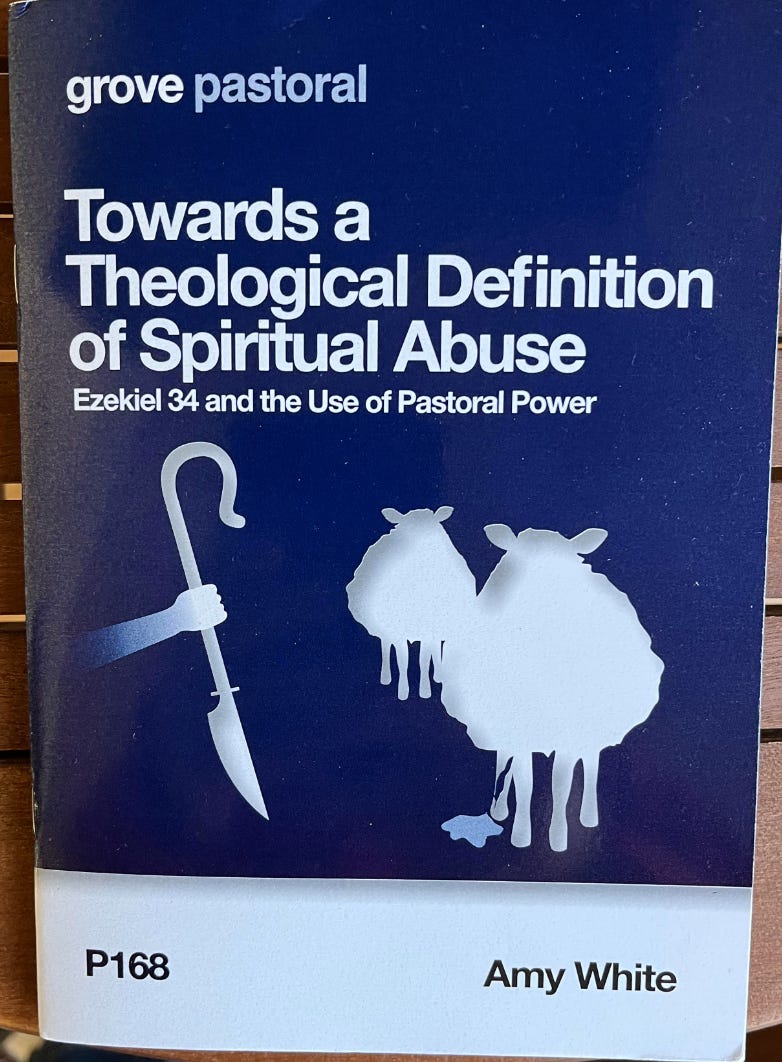What are the marks of spiritual abuse? Recall that spiritual abuse is a species of power abuse, so it is about abusing the power one has over another person. It become spiritual when the asymmetry of power includes a person with spiritual power over another person.
There are three basic elements to spiritual abuse: the asymmetry in power between a person with some kind of spiritual authority and another person; it is most noticeable when there is a pattern of abuse though a single case can constitute spiritual abuse; and behaviors by that spiritual authority that psychologically, emotionally, and spiritually wound a person.
Amy White has now written a booklet called Towards a Theological Definition of Spiritual Abuse: Ezekiel 34 and the Use of Pastoral Power that advances our understanding of spiritual abuse by taking a close look at the paradigmatic passage about spiritual abuse in the Bible, namely Ezekiel 34. Jesus considers some of the authorities in his environment as fitting that passage. Matthew’s description says “When he saw the crowds, he had compassion for them, because they were harassed and helpless, like sheep without a shepherd” (Matthew 9:36).
I want to sketch some of Amy White’s observations and add to them in my own descriptions. But her work has stimulated all that I saw below.
First, perception of God the Shepherd is shaped by our experience of God’s undershepherds, which we call pastors (priests, etc). God is both the model and, yes this is true too, God is the expectation when people experience a pastor. That is, people envision God through their experience of their pastor. They expect the pastor to mediate God to them, and to be to them what God is as Shepherd. That is why the image of God as Shepherd matters so much. God is the model of the Shepher. Notice these verses in Ezekiel 34.
The bad human shepherds look like this:
You have not strengthened the weak, you have not healed the sick, you have not bound up the injured, you have not brought back the strayed, you have not sought the lost, but with force and harshness you have ruled them (34:4).
The good divine shepherd looks like this:
I will seek the lost, and I will bring back the strayed, and I will bind up the injured, and I will strengthen the weak, but the fat and the strong I will destroy. I will feed them with justice (34:16).
The bad human shepherds are wrong because the divine shepherd in v. 16 is what good shepherding looks like.
Is the model too good and the expectation too high? Yes, of course, but the good human shepherd strives to do the work of God for the people under her care.
Second, the flock can be abusive as well. Notice Ezek 34:17-22:
34:17 As for you, my flock, thus says the Lord GOD: I shall judge between sheep and sheep, between rams and goats: 18 Is it not enough for you to feed on the good pasture, but you must tread down with your feet the rest of your pasture? When you drink of clear water, must you foul the rest with your feet? 19 And must my sheep eat what you have trodden with your feet, and drink what you have fouled with your feet?
:20 Therefore, thus says the Lord GOD to them: I myself will judge between the fat sheep and the lean sheep. 21 Because you pushed with flank and shoulder, and butted at all the weak animals with your horns until you scattered them far and wide, 22 I will save my flock, and they shall no longer be ravaged; and I will judge between sheep and sheep.
Fat sheep and lean sheep; dominant sheep and weaker sheep.
The impact of both bad human shepherds and abusive sheep is the same: the people are scattered and become vulnerable and are ravaged. They are ravaged by selfish behaviors and violent actions. This can happen in churches because of “relational and financial influence” and by “structural vote” or a sense of “superiority over their leader(s).” Amy White asks the right question: “Who is benefiting from the exercise of power?” (in italics in original).
Third, Ezekiel 34 brings to the discussion the vital importance of power at work in spiritual abuse. Both the bad humans shepherds and the bad sheep exercised some power they possessed in ways that were selfish and abusive of others. Amy White does not think this is clear enough in the Oakley-Humphreys definition. I pointed to their definition here:
Spiritual abuse is a form of emotional and psychological abuse. It is characterized by a systematic pattern of coercive and controlling behaviour in a religious context Spiritual abuse can have a deeply damaging impact on those who experience it. This abuse may include: manipulation and exploitation, enforced accountability, censorship of decision making, requirements for secrecy and silence, coercion to conform, [inability to ask questions] control through the use of sacred texts or teaching, requirement of obedience to the abuser, the suggestion that the abuser has a ‘divine’ position, isolation as a means of punishment, and superiority and elitism.
I do see it at work in their definition and in the book, but the sense of asymmetry is perhaps not as clear as it could be. Since reading Oakley and Humphrey the term “asymmetry” has become a vital part of how I have talked about spiritual abuse, and I’m not sure where I got it. Anyway, White’s point is important for definition.
Fourth, what Amy White brings to the discussion especially in that pastoral neglect is a form of spiritual abuse. Again, Ezekiel 34:4 makes the point crystal clear:
You have not strengthened the weak,
you have not healed the sick,
you have not bound up the injured,
you have not brought back the strayed,
you have not sought the lost,
but with force and harshness you have ruled them (34:4).
Power comes through in the last line but the other five lines are about pastoral neglect.
How do we see pastoral neglect today? I’m gonna push this button. Megachurches struggle to with pastoral neglect; in fact, many fail entirely. There are so many people and only so many “pastors” that many are both unknown by name and unrecognized by face, and of course that means life stories are not known and pastoral care is not given. Funerals are performed by someone assigned to that task but the one performing the funeral has to interview the family in order to know the person. The single most significant failure of many megachurches is pastoral neglect of persons in the church.
Finally, spiritual abuse results in (1) scattering the flock, which can describe many Christians attending churches today. They come to church and when they leave they are as good as gone for the pastoral staff because no one knows them and what they are up to. (2) Experiences of spiritual abuse result in a loss of trust in God and the pastors. The Nones tell this story at times. (At times the stories themselves are false narratives.) But one should be alert to the reality that spiritual abuse impacts a person’s relationship with God and with the church. (3) Spiritual abuse trades and leads to victims experiencing fear of the leader, of the pastoral staff, and of the church’s flying monkeys. (4) Neglect results in lack of healing and care and the presence of pain and wounds. (5) When the Fat sheep take over the weaker sheep are overwhelmed, dominated, scattered, wandering and looking for help where they can find it.






Neglect really is an important (and neglected) aspect of spiritual abuse (and abuse in general). The Westminster Larger Catechism lists Ezekiel 34:2-4 as the proof text for the sin of neglect by those in positions of authority (“superiors”). The whole answer to question 130 is relevant to this discussion:
Question 130. What are the sins of superiors?
A. The sins of superiors are, besides the neglect of the duties required of them, an inordinate seeking of themselves, their own glory, ease, profit, or pleasure; commanding things unlawful, or not in the power of inferiors to perform; counseling, encouraging, or favoring them in that which is evil; dissuading, discouraging, or discountenancing them in that which is good; correcting them unduly; careless exposing, or leaving them to wrong, temptation, and danger; provoking them to wrath; or anyway dishonoring themselves, or lessening their authority, by an unjust, indiscreet, rigorous, or remiss behavior.
A long time ago (mid-1990s) I served as dean of a tiny seminary with an extraordinary core faculty ("core" meaning one each in Old Testament, New Testament, and Theology). Each of these men had all the requisite graduate degrees and could have intimidated students with ease. BUT what was at the core of each of those them was a wonderful humility as they came alongside students. I learned so much as I watched students grow in that environment. I KNOW it's possible to "lead" from the side and not necessarily from "the top." What was true there CAN be true in churches, but I suspect that it takes a humility before God if that is to happen.